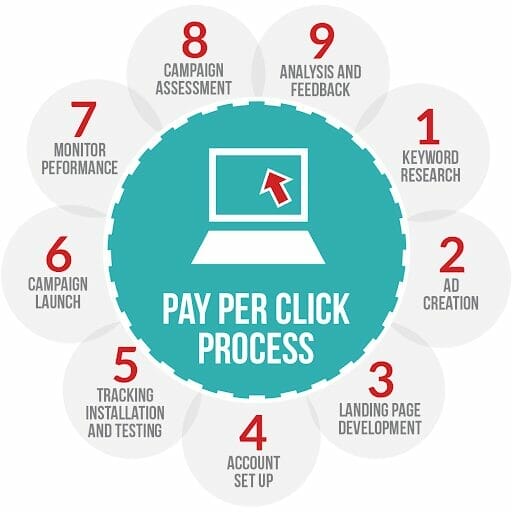
What is PPC Search Engine Marketing?
Pay-Per-Click (PPC) search engine marketing is a type of online advertising where advertisers pay a fee each time someone clicks on their ad. This method helps businesses drive targeted traffic quickly. PPC is effective when combined with a strong content marketing strategy. Using platforms like Google Ads, businesses can reach their audience and get immediate results.
How Does PPC Advertising Work?
PPC advertising places small ads on search engine results pages (SERPs). Advertisers bid on keywords relevant to their products or services. When users search for those terms, the ad appears. Advertisers only pay when someone clicks the ad and visits their site. No payment is required for just appearing in search results—costs only incur per click.
Top PPC Search Engines
1. Google Ads
Google is the most popular search engine, handling 50% to 80% of all search traffic. Additionally, its advertising platform, Google Ads, provides extensive tutorials, free analytics, and a low $5 startup fee. The Google network includes platforms like AOL, Ask.com, Netscape, and EarthLink. Advertisers can also expand their reach through content partners like The New York Times and CBS Sportsline.
2. Bing Ads (Yahoo! and Microsoft)
Bing and Yahoo! offer PPC options similar to Google Ads. Users select keywords, set daily budgets, and bid per click. The minimum startup fee is $5. This platform allows businesses to reach users outside of Google’s ecosystem.
3. Ask.com
Ask.com has a unique audience, with only a 21% overlap with Yahoo! and 22% with Google. This means 80% of its users do not use other major search engines. Its PPC system operates similarly to Google Ads and Yahoo!, allowing advertisers to compete effectively.
4. MSN PPC Ads
MSN provides PPC advertising under a pay-for-performance model. Ads are ranked based on bid amounts and undergo an editorial review. This ensures quality and relevance before they appear in search results.
Steps to Create a PPC Campaign
- Set a Budget – Determine how much you are willing to spend on PPC advertising. Large search engines offer wide exposure but can be more expensive.
- Select Keywords – Choose relevant keywords to maximize ad effectiveness. Proper keyword selection ensures ads reach the right audience.
- Write Engaging Ad Copy – Craft a compelling headline and description. The goal is to attract clicks and drive users to a landing page.
- Set a Bid Amount – Decide the maximum amount you are willing to pay per click. The more competitive the keyword, the higher the bid required to rank at the top.
Is PPC Right for You?
A well-managed PPC campaign, combined with search engine optimization (SEO), can improve a website’s traffic and visibility. Companies like Psycray specialize in PPC strategies and can tailor campaigns to fit specific business needs. PPC provides immediate traffic, while SEO builds long-term rankings. A balanced approach helps maximize online presence and marketing success.
PayperclickUniverse.com “Pay per Click Advertising”
Searchengineguide.com “The Small Business Guide to SEO and PPC marketing.
Searchengineguide.com “The Small Business Guide to Serch Marketing”
See More Resource
Psycray – PPC Strategy & Campaign Management
https://www.psycray.com/ppc-management
Psycray specializes in designing PPC strategies to optimize ad spend and maximize ROI.
Psycray – SEO & PPC Integrated Solutions
https://www.psycray.com/seo-ppc-solutions
Combine SEO and PPC for long-term growth and immediate traffic boost.
WordStream – PPC University
https://www.wordstream.com/learn
Free PPC learning hub with guides and courses to master Google Ads and Bing Ads.
HubSpot – What Is PPC?
https://blog.hubspot.com/marketing/ppc
In-depth article explaining what PPC is and how to run effective PPC campaigns.
Search Engine Land – PPC Guide
https://searchengineland.com/library/ppc
Comprehensive PPC library covering the latest trends and strategies in paid search.

